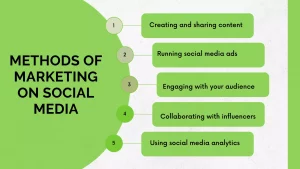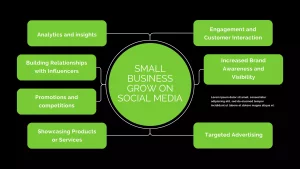How To Perform Marketing On Social Media For Small Businesses?
Small businesses can grow their customer base, reach a wider audience, and expand their operations with the help of marketing on social media.
Social media is more important for small businesses since it helps them gain market share faster than their rivals.
Continue reading the blog if you’ve just launched a small business and want to expand it.

Social media platforms are used in social media marketing to advertise a good or service. It can be used to generate leads, connect with customers, and reach a larger audience.
Social media marketing can be done in a variety of ways, but some of the most popular ones are as follows:
- Creating and sharing content: The process of producing and disseminating content can involve writing blog posts, articles, films, photos, and infographics.
- Running social media ads: By using social media ads, you may target particular demographics and interests with your paid advertising.
- Engaging with your audience: You may do this by answering questions and comments, hosting competitions and giveaways, and taking part in social media discussions.
- Collaborating with influencers: Working with influencers is a fantastic method to expose your company and reach a new audience.
- Using social media analytics: By monitoring the effectiveness of your social media initiatives, you can make the required corrections.
How Small Business Grow With Social Media?

By using social media channels strategically, small businesses can develop significantly. Here are some strategies they can use to their advantage, along with some examples:
- Increased Brand Awareness and Visibility:
Small businesses can improve their visibility and build brand recognition by producing interesting content and posting frequently on social media. A strong brand presence can be developed through posting about goods, services, behind-the-scenes peeks, and customer reviews. As an illustration, a neighbourhood bakery frequently uploads images of its freshly baked goodies to Instagram to showcase its products and draw in local residents as clients. - Targeted Advertising:
Social media platforms include sophisticated targeting capabilities that let small businesses reach their target market based on their demographics, interests, and habits. By doing this, they can be certain that the viewers of their content are those who will interact with it. For instance, a virtual trainer can advertise their training sessions to customers interested in health and fitness by running tailored Facebook advertising. - Engagement and Customer Interaction:
Social media gives small businesses a direct line of communication with their customers. A sense of community is strengthened and consumer loyalty is increased through responding to comments, messages, and feedback. A boutique apparel company responds to questions and comments on its Facebook page right away, which improves the customer experience and fosters the development of a devoted clientele. - Showcasing Products or Services:
By using photos and videos, small enterprises may demonstrate their offerings graphically. To establish a more intimate relationship with the audience, consider demonstrating how things operate or sharing user-generated material. To give clients a window into their trade, one artisan soap maker posts videos on Instagram Stories that show how they produce handmade soaps. - Promotions and competitions:
Social media is a great platform for holding sales, giveaways, and competitions to encourage participation and draw in new clients. Example: To generate interest and broaden their online audience, a small restaurant holds a Facebook contest in which participants share their favourite dish for a chance to win a free dinner. - Building Relationships with Influencers:
A small business’s reach can be expanded by working with regional or micro-influencers. To their attentive followers, these influencers are able to legitimately recommend things. Example: To attract a larger audience and establish credibility, a skincare company teams up with a local beauty blogger to review and advertise their products on YouTube. - Analytics and insights:
Social media networks offer analytics tools that give information on audience behaviour, engagement levels, and content performance. These findings can help small enterprises hone their tactics. As an illustration, an online bookstore examines engagement analytics to identify which book genres connect with their audience the most, enabling them to customise their content appropriately.
Also Read : Guide to Build a Strong Social Media Community
Conclusion
Social networking may help small businesses succeed and expand. To get others to know and like them, they can employ witty posts, clever advertisements, friendly conversation, and being genuine.
When they effectively utilize social media, small companies may increase their visibility, please their customers, and grow. Send us an email at hello[at]noboruworld.com if you want our assistance with this.
FAQ
Why is social media crucial to the success of my small business?
By marketing your goods or services online, social media helps your business expand, connect with clients, grow your brand, and reach a wider audience.
What platforms on social media should my small business use?
Which platforms are ideal depends on who your target market is. Facebook, Instagram, Twitter, LinkedIn, and Pinterest are popular choices. Pick a platform based on how active your clients are there.
How might social media assist me in acquiring new clients?
You may attract potential clients who could be interested in what your business has to offer through targeted advertising and interesting content, helping you grow your clientele.
Read More – Social Media Marketing for Businesses



